Bad judgement
calls leave Formula 1 in disarray in a year of rising
young stars
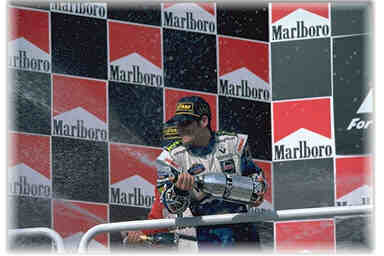
"I won't play
it dirty, I want the championship decided on the race
track, not across a table in a court in Paris or in a
collision." (Michael Schumacher
Qualifying for the European Grand Prix at Jerez)
The fat lady
didn’t just sing she screamed blue murder. The
grand finale to the season was not a collective bow
to the crowd, was not a standing ovation for the
players, but a boo and a hiss to the villain of the
piece. Drama and tension were plentiful. There was
luck, there was misfortune and there was derring
do but in the end, F1 laid itself bare to the
clinical gaze of both the uninitiated public and fans
alike, revealing a darker underbelly of
mismanagement, ugliness and greed.
But didn’t it all
start out so well? The optimism put out by the
various teams was only equalled by the drivers. Some
who had changed teams, some who swore that this year
was going to be the one in which they came of age.
A case in point was Damon
Hill, hoodwinked by the smooth operation of the
newly acquired TWR/Arrows team, "We won’t
make any claims for 1997, but I believe we will make
rapid progress." Said Hill. " From
what I have seen of the Tom Walkinshaw operation,
there is a germ of a great team for the future."
Maybe so but not in Damon’s year with the team
and it all turned sour on the eve of the British Grand Prix with boss Walkinshaw
telling his experienced protégée to ‘shape up
or ship out’. Hill did both.
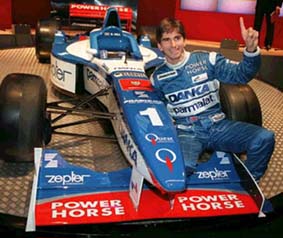
Having witnessed his
racing career slip from the top to the bottom of the
heap in three short months, he spoke candidly about
his contentment with the team in May. "I read
a lot of reports from the races for my own amusement
and they seem to give the impression that I am
despondent, I'm unhappy, I'm dejected and I'm cross.
But it couldn't be further from the truth." Two
months later at the start of the British Grand Prix weekend, the honeymoon seemed
to be at and end. Having not finished the first three
races of the season, Hill was faring low to dreadful
and Walkinshaw was not a happy man. "We’re
at the time when we are seriously considering our
drivers for next season and his performances speak
for themselves." He said. "It’s
quite obvious to any one who has been watching the
team closely that we aren’t satisfied.
We’re not satisfied with his performance and nor
should he. He has had too many accidents,
particularly in the early laps and he hasn’t
been qualifying as he should.".
Hill’s
performance rating has indeed been poor this year but
with a few exceptions it has been entirely down to
the team. Whether one qualifies first or last, if the
engine expires, one does not finish the race. The
list of incidents makes for unhappy reading.
In Melbourne, a throttle failure during the
warm up lap saved Hill from an inevitably
embarrassing finishing position. In Brazil, with a not discreditable 11th
place secure, Hill’s oil cooler caught fire.
Diniz spun out a lap later. Argentina saw his retirement with
overheating and air pressure problems. Team mate Pedro
Diniz also retired with a blown Yamaha. Imola, saw Hill forced to
start from the pit lane due to a mechanical fault in
the Arrows A18 in the shape of a starter
motor shaft oil seal failure. Frustrated at being
blocked by the Prost of Nakano,
he later collided with the Japanese novice for which
he received a one race suspended ban. Diniz also
received the same for causing a near miss with
Jacques Villeneuve. Rain caused a great many
retirements in Monaco, Hill collided with Eddie
Irvine’s Ferrari, braking heavily to avoid a
collision. Hill was running in a strong 6th slot in Barcelona when the Yamaha engine let go, maintaining his
unbroken record of non finishes for the TWR team. In
a race of attrition and cut short by Olivier
Panis’ accident, Montreal gave Hill his first finish of
the season albeit 9th and last. Finally, on the first
lap at Magny Cours, squeezed from the back of the
pack funnelling in to the first right hander, he
damaged his front wing forcing lengthy repairs and a
finishing position of last.
In a sweeping
statement, Walkinshaw said "any professional
is only as good as his last race. You should be
trying 110% to show others they should want
you." Hill qualified in 12th position sharing the
grid with 11th placed Benetton driver Jean
Alesi and gave his TWR Arrows team their first
point of the season by finishing a hard fought sixth.
In the Hungarian Grand Prix, with aerodynamicist John
Barnard added to the team, he was inexplicably on
a certain win, when a rubber washer in the hydraulic
system put him in trouble on the last lap. He lost
his 35 second lead to Villeneuve and was lucky to
cross the line in second place mere moments ahead of Johnny
Herbert.
Hill had tasted
success again after the drought of ten races and
there was no way he could stay at TWR. Knowing
full well that they would be forced to use the
practically impotent Yamaha for another season having been
rejected by Mugen-Honda in favour of
Jordan who, in turn, were losing their Peugeot
engine to the Prost team, it was more by luck
than his own rather wayward judgement that he ended
up with a team that he should have joined last year.
In phrasing disquietingly similar to that which he
made from TWR’s Leafield base last year, Hill
said, "I am absolutely delighted to be
driving for the Benson and Hedges Jordan Mugen Honda
team, starting next year. I believe that my choice of
team will provide me with the perfect environment to
win races and ultimately challenge for my second
Formula One World Championship." High hopes
indeed but the chances of achieving it with Jordan
look a lot rosier than they ever did with TWR.
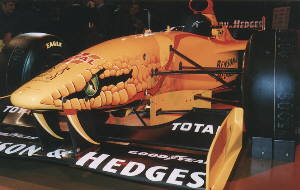
Jordan of course, launched their
’97 car with a massive financial investment in
technology and staff, buoyed up by an increased
pay-packet from sponsors Benson & Hedges
and despite finishing in the same position as last
year were considerably up on both drivers and
constructors points. The brilliant Giancarlo
Fisichella showed far and away the greatest
potential of any rookie driver( and there were a
few,) on the track and it was only through the
‘bully boy’ tactics and immaturity of his
team mate Ralf Schumacher that he didn’t
get more podium positions. Fireworks were promised by
Eddie Jordan at the beginning of the season
and pyrotechnics there certainly were. A hard
talking-to by their boss seemed to put things in
perspective yet the young Schumacher’s
thoughtlessness at the Luxembourg Grand Prix in gunning for his Italian
rival, culminated in a first corner accident that
forced his older brother off the track and into an
early retirement at a crucial point in the
championship. Belligerent, as he was regarded by many
in the pit lane, he said, "It was a normal
start incident. I made my best start of my career so
far and had moved up to fifth place. We all braked a
bit late at the first corner and there was just not
enough room." He went on, "My car
jumped up in the air, I hit Michael and we were all
off. It was potentially quite dangerous, so I suppose
we should be quite happy no one was hurt. The
consequences were bad for our team and for my brother
Michael."
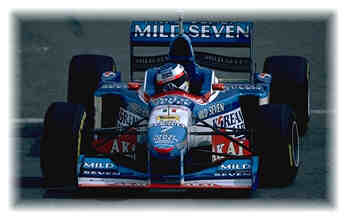
Both lived to fight
again, Fisichella fighting along with Jordan to hold on to a solid offer of
a seat for ’98. Benetton boss Flavio Briatore
decided to exercise his option on his wonderboy and
take him for Benetton. The courts decided in favour
of the mercurial Italian playboy and Fisichella,
not always fluent with his broken English was more
eloquent than most when he said after the German Grand Prix, "I finish my dream
... my target was the podium and now ...
nothing." Benetton will surely give
him his first Victory, although their form will have
to improve dramatically. Having not had a victory
since their golden egg-laying goose, Schumacher,
left to sort the flagging Ferrari out, Briatore’s boys Gerhard
Berger and Jean Alesi, would be out
looking for jobs at the end of the season.
Alesi’s relationship with one time close pal
Flavio, had rapidly deteriorated to the extent that
Briatore was accusing him of knowing the names of the
crew of his boat rather than the mechanics in the
pits. Alesi moved on and down, pushed out of a top
four team for the first time since upgrading from Tyrrell in a blaze of speculative
glory, to the honest, but under-achieving Swiss Sauber team.
An ongoing sinus
problem for Berger caused him to miss out on
the Canadian, French and British Grands Prix and when his father died in a
plane crash one could have forgiven him for giving up
the ghost, but his comeback performance at the German Grand Prix was one of the highlights of
the year.
The outside chance of
a non German to take the honours, was a pretty slim
one at the beginning of the weekend, with the
brothers Schumacher in fine form and a highly charged
but poorly performing Heinz Harald Frentzen,
desperate to soothe the ever shortening tempers of
his Williams bosses. But a rejuvenated Gerhard
Berger, returning to Benetton after his three
race absence with a decision to look for fresh fields
next season, shared the front row of the grid with Giancarlo
Fisichella, the young driver who will replace him
and then showed him a clean pair of heels for
the entirety of the race. In a weekend, where all the
talk was of ‘young blood’ drivers,
hungry for the spoils of their elders and at a
fraction of the cost, the dinosaurs roared back with
a show of strength that proved experience can, on
occasion, be worth more than motivation.
Finishing 17 seconds
ahead of Michael Schumacher after having
driven a precise and intelligent race, an emotional
Berger said, "I really felt I had some
special power here this weekend. I knew when I came
back that all the Media sharks were waiting to get
some negative headlines and I wanted to show them
that it’s different and I did it." The
Austrian National Anthem played for the first time in
two years, ironically at the same circuit where
Berger had his last victory and he no doubt he shed a
private tear, thinking that his father would have
been overjoyed by the occasion had he been there to
witness it.
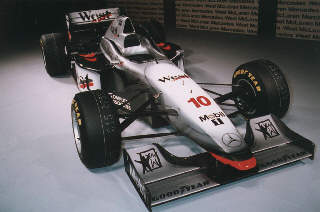
McLaren brought Rock ‘n Roll to
F1 with the Spice Girls pushing their car out
in front of the public gaze. With new sponsors,
German cigarette company West, the car was
indeed drop dead gorgeous and knocked spots of any
momentary beauty that the five gyrating songsters
could muster. The smile on Boss Ron Dennis’
face was justified. Having started and finished the
season with a win (their first since 1993) and taking
another at Monza and two second places, the
resurgence of this once dominant force on the grid,
had begun. Mercedes power, however has not been
faultless as Mika Hakkinen would agree. A
potential birthday present for the ‘Flying
Finn’ and a double whammy for McLaren at the Luxembourg Grand Prix, turned into a debacle for
Mercedes when it suffered two engine blowouts within
a lap of each other.
First, Hakkinen’s
team mate, David Coulthard’s engine
exploded in a big way on lap 42 in front of the
Grandstand and no doubt all Mercedes’ invited finery.
Philosophical as ever he said, "If you are
going faster than the rest and we have shown that we
were the quickest package this weekend, you must be
closer to the edge and unfortunately we were too
close today." He didn’t realise how
close he was, for a lap later and in an uncannily
similar fashion to the two Prosts of Nakano
and Trulli in Austria a fortnight earlier,
Hakinnen’s engine too let go, a few hundred
yards further along the straight at the exit to the
pit lane. Magnificent in yet another devastating
defeat, Hakinnen echoed the words of his team mate.
"I was all the time following the pit boards and
saving the tyres and the engine. McLaren Mercedes
want to be the best so you always expect some
failures, just as I want to be the best and I make
some mistakes too." As a disappointed
McLaren team manager Ron Dennis said, "To
finish first, first you’ve got to finish."
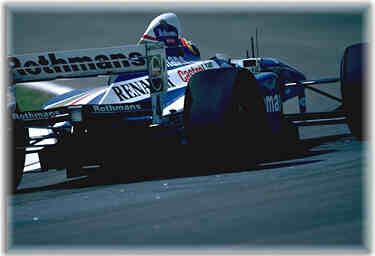
In 1997, Williams brought with them their 1996
reputation of absolute dominance and for the first
part of the season proved invincible. Jacques
Villeneuve in his second year with the team and
easily staving off the overblown reputation of new
signing Heinz Harald Frentzen, could have won
everything in sight, but as it was, the first half of
the season was marred by 4 retirements. A first
corner confrontation with Eddie Irvine’s Ferrari in Australia, a gearbox problem at Imola, badly misjudged weather
conditions at Monaco and a concrete wall in Canada,
all added to the brilliant confusion that seemed to
divide the Williams team despite winning five Grands
Prix up to and including the race at Silverstone.
With Schumacher
rapidly overtaking the Canadian in the points race,
it seemed that Villeneuve was on a suicidal mission
to scupper any chance that he had of clinching an
early championship title. In an interview published
in the German Publication ‘Der Spiegel’
he claimed that the new rules designed to curb the
ever increasing speed of Formula one cars, were
‘shit’. "I think it's going to take
a lot away from the driver," he protested. "Instead
of still being the ultimate sport that it is, it's
going to become more of a show and a circus." Villeneuve
had always advocated the ‘fun’ aspect of
driving and ‘taking things to the edge’ and
firmly believed that the FIA was going in the wrong
direction with its rules regarding grooved tyres and
a narrower car width. "We need bigger tires
and 70% smaller wings," he said, "There's
no longer any difference between Monaco and a 160
km/h bend at Barcelona -- no faster heart beat, no
adrenaline, nothing but disappointment."
This didn’t sit
well with the FIA who called him before a
board of enquiry during the lead up to the Canadian Grand Prix. Villeneuve said afterwards, "I
haven’t been asked to change my views, Just my
language." An uneasy truce was declared
following a reprimand and, sporting a new bottle
blonde head of hair, he pulled his finger out to take
the races in Hungary (from an unlucky Hill), Austria and Luxembourg, putting him back on the track
for a thrilling climax to the Championship.
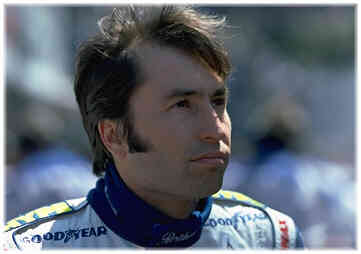
Frentzen was having a
bad season and was obviously causing frustration in
the Williams camp. However a win at Imola, stopped
the back stabbing from the media and, with Schumacher
out of the Frame at the end of the season, two second
places and four thirds, ensured a one two for Williams and outgoing engine supplier Renault. His win at the San Marino Grand Prix was obviously a relief to him.
"It’s very much like....oil on my
soul." He said later.
Fully aware of the
increased pressure that was now put on him to
continue his success rather than to achieve it for
the first time, Frentzen stated that he ‘become
the prey instead of being the hunter’.
Yet despite his
undeniably dazzling win, a shadow of doubt still
existed as to Frentzen’s consistent race winning
capabilities. With the real yard stick having retired
and his fellow countryman (Schumacher) driving a car
(Ferrari) lacking the outright speed of the Williams,
yet finishing less than a second and a half behind,
the German had still to be the hunter and win
regularly, against his team mate and the only man
capable of going faster.
Then there was Michael
Schumacher, by far and away the greatest talent
of the season, producing a clutch of absolute classic
drives to prove beyond all doubt that as a driver in
the wet or dry, he has yet to find his equal. As a
man however, all is not right with the rich threads
of heroism and sportsmanship, that form the legends
which turn into folklore over the passing years.

At Monaco, an enlightened reading of the
weather left main rival Williams totally out of
contention and Schumacher took the flag after the two
hour time limit had expired, with ten cars out of the
twenty two remaining and a massive 53 seconds ahead
of a delighted Rubens Barichello, giving the
first podium finish to Jackie Stewarts fledgling
team. After giving Ferrari team boss Jean Todt a
joyous chair lift the two Ferrari drivers abandoned
Barichello on the podium to give their pit crew a
liberal dowsing of Moet. The good times for Ferrari
it seemed, were back.
Having been accused of
‘sandbagging’ during preseason testing, it
was not surprising to see him take the French Grand Prix in similar circumstances by
the scruff of the neck, shake it and deposit the
remains in front of a bewildered Williams pit who were by now becoming
uncomfortably familiar with getting it wrong.
Celebrating his third victory in 4 races, he put paid
to pre race doubts as to his competitiveness by
saying "Why does our car work suddenly? My
predictions for this race were wrong and this was a
convincing win. to take pole position and win the
race, is the best you can do". The press
still unconvinced that there was still something left
up Ferrari’s scarlet sleeve were proved
right again at a wet wet Spa-Francorchamps circuit.
It was awe inspiring
to see the greatest technological sport in the world
brought to it’s knees by mother nature and
whereas all the plans were made, all strategies set
with cars looking pretty for their brief posing time
on the grid, the not totally unexpected happened. A
downpour of severe proportions 15 minutes before the
start, turned the track into an inky black slick and
parts into a shallow swimming pool. Schumacher
proved yet again his mastery in the wet, by
dominating the race from the first lap. The
Williams’ so dominant in qualifying, disappeared
from view relatively quickly leaving only the
Mercurial Jean Alesi and star new boy, Giancarlo
Fisichella to contest the race. "I
wasn’t too optimistic for the race." Said
Schumacher afterwards. "Under straight
forward circumstances in the dry, I think we would
have struggled, but in the wet and making the right
choice of tyre everything went perfectly."
The tyre factor was
supposed to play a greater part than it actually did
for the 1997 season with the arrival Bridgestone
taking the mid and back field under its wing. Its
rain tyres were supposedly worth over a second a lap
on the tried and tested Goodyears, but then
the top four or five Goodyear-shod drivers in the top
four or five teams were worth that also and then some
more. Bridgestone stayed where it was in the lower
rankings, but still generating positive comment and
no doubt made some of its lesser teams look a lot
better than they actually were. The decision by Goodyear
to pull out of F1, has without doubt been influenced
by Bridgestone who are quite prepared to take
on the American Company’s burden of supplying
the whole grid in 1999.
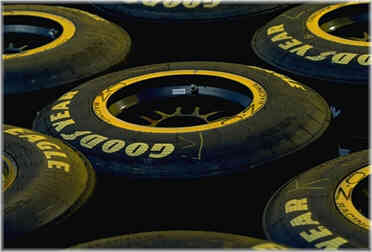
In a surprise move
that left the Motor Racing fraternity stunned, Goodyear
Racing decided to pull out of Formula 1 after the
1998 season. In a statement, a spokesman for Goodyear
said, "Rule changes imposed for 1998 are a
major factor in our decision." He also
stated that the 'rising costs of Formula One'
influenced their withdrawal.
McLaren with only a year left to run
on its contract were the first of the front runners
to make the switch to Japanese rubber for the coming
season and it looks as though there might be a few
more to follow, having reservations about the
continued commitment by Goodyear, to continual
research and development throughout 1997.
It was a season of
young guns, hungry for the prizes, who’s
exuberance far out weighed their driving abilities,
yet by mid season there was a definite pecking order,
head and shoulders above which, was young Giancarlo
Fisichella. Having driven with intelligence and
style, eclipsing his quick but impetuous team mate Ralf
Schumacher, his performance tailed off towards
the end of the season. This could be due to the end
of the modification programme on the Jordan 197 or the stress of being bandied
about and fought over by Eddie Jordan and
Benetton boss Flavio Briatore, who claimed
that they had the right to use his services for the
coming season. Eddie Jordan lost as expected
and it will be Benetton Mecachrome who will
have the advantage of his talent for ‘98.
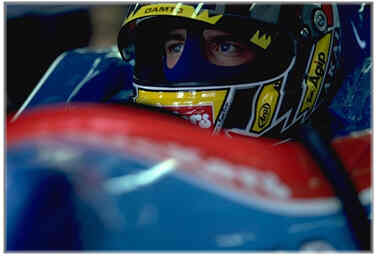
With the arrival of Dave
Richards to take over the reins of a team that
had become complacent and directionless under the
hands of the disenchanted Italian playboy Briatore, a
new era for the Italian team is about to commence.
With the proven ability of Fisichella now that his
apprenticeship in F1 has been served and new signing
and surprise of mid season racing, Alexander Wurz
as replacement for the ailing Berger, Benetton should emerge as a hungry young
team with everything to go for and podium finishes
expected rather then hoped for.
Jarno Trulli
surprised many with his intelligent driving for the
Prost team whilst deputising for Olivier Panis
who suffered two broken legs in an accident at the Canadian Grand Prix. He will be a permanent fixture
for the new team in their second season in F1 for
1998.
The debacle that was Jerez ended the Formula 1 year amid
cries from the press of ‘whitewash’ and
'mismanagement'. The popular opinion was that
Schumacher deserved to take the crown for his out and
out driving performances in making the not altogether
roadworthy Ferrari look like a winner even if
it wasn’t. Reliability problems at Silverstone and his unfortunate
‘off’ in Luxembourg were not of his making and had
he collected further points for these two races, he
would probably have been champion before Jerez, so possibly preventing
his disgraceful actions that only made the press
switch allegiance immediately to ‘bad boy’
Villeneuve and hail him as the ‘peoples’
champion. Schumacher had instantly become a
dirty word.
On lap 48, Villeneuve
saw the Ferrari go wide at the Curva Dry
Sack, leaving an opportunity for him to slip
through on the inside under braking. As the Williams
drew level, Schumacher realising that he had made a
fatal error in giving his rival the space in which to
overtake, seemed to deliberately and sharply alter
course, making contact with the side radiator of
Villeneuve’s car and launching himself into the
gravel, his wheels spinning ineffectually. It was a
tragic piece of driving seemingly proving that
winning the race by fighting to the flag, was never
on his agenda and it has marred irrevocably a season
in which Schumacher has shown a new found maturity
dominated by masterful driving and sportsmanship.
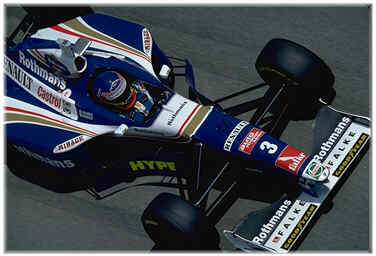
The Steward of the
Race deemed it a ‘racing accident’ and that
‘No further action needed to be taken’ but
the baying of the press especially and ironically the
German press, forced the FIA to re-examine the
incident.
An 'act of aggression'
had not been unexpected and Williams technical
director Patrick Head ominously referred to
previous incidents involving the German. "The
man who gets ahead is in a position where, as
we’ve seen before, he can be very aggressive
with the person behind." He said cautiously
after the previous days qualifying. "I think that’s
what happened to Damon in Adelaide in ’94, a
deliberate removal of a competitor. The man with less
points has to be very careful if he’s
challenging for the lead." Prophetic words
indeed and, so it came to pass...
Bernie Ecclestone,
67 year old F1 ringmaster, had also issued a stern
pre- race warning to both Championship contenders and
threatened severe repercussions if it came to dirty
driving on the track. "The guilty party can
expect to be a spectator in the first few rounds in
1998. We will also hit them where it really hurts, in
their wallets, if they step out of line," he
said. "Accidents do occur in the heat of the
moment, especially when there is so much at stake,
but we don't want them to do anything silly. Past
championships have been decided by one driver taking
another off and it must not happen again."
These as it turned out were hollow threats.
In the heat of the
moment, these fine words had been ignored. Yet to
their eternal shame the FIA when it came down
to sanctions, repercussions and punishment, let the
perpetrator off the hook with what amounted to a mere
smack on the wrist in a show of toothless neglection
of their roll as governing body of a sport that needs
to be ruled with a rod of carbon fibre. To sanction
Schumacher by banning him as Ecclestone threatened to
do, from the first few races of ’98, would have
been the natural thing to do, but it would only
highlight the current lawlessness of Formula 1, and
fuel controversy as it has done over the closed
season. This would please nobody and the sport found
itself saddled with a ‘Jerezgate’
that, like Adelaide in 1994 refused to go
away. Had Schumacher got away with it and put the
Canadian out or, if they had both gone out, he would
have won the Championship and the penalty would have
been severe. As it was he only hurt himself and it
was the ultimately his heaviest cross to bear.
However his name being
excluded from the 1997 championship tables, was
hardly any punishment at all. To Schumacher coming
second or twenty second is of no consequence. He
didn’t win and that was an end to it. The fact
that he was allowed to keep all his race wins and
points made a mockery of the scoring system and with
five race wins to his name and 78 points still in his
personal CV it will seem like a ghost had been
driving to future historians of Formula 1. His name
still appears in championship listings in second
place under Villeneuve along with his race wins. The
only difference is that there is no positional number
beside it.
To add insult to
injury the accusations of collusion between Williams and McLaren in which the McLarens of David
Coulthard and Mika Hakkinen were allowed
to pass to take a one - two for the Woking team, were
sanctioned by the FIA, the furore being
further muddied by the unscrupulous interjection
purportedly by Ferrari, in an attempt to take the
heat of Schumacher’s impending hearing, of
transcripts of pit to car recordings allegedly
corroborating the facts.
Whether or not it was
disproved by the parties involved, the incidents did
happen and can only be judged from a moral point of
view. From the trackside observer, it seemed that
Villeneuve in his damaged car, was quite capable of
holding off Hakinnen’s advances for the final
lap to secure the race for Renault, but then who
knows how the McLarens would have changed the shape
of the race had they actually raced the Williams as
is the bounden duty of any racing driver.
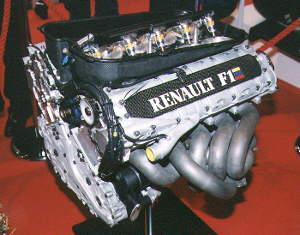
It was also a rebuff
to Renault who has provided Williams with
the ripest fruit from the tree of superiority for the
last 9 years, giving them 63 race wins. As Renault
Sport President Patrick Faure said, "I
think Renault will be remembered for its
loyalty." Which is more than can be said of
boss Frank Williams. "Formula 1 is no
world of angels," Faure continued. "...it
is possible to respect such values as loyalty and
fair play even in such a demanding environment."
The season rounded off
with ‘sleaze’ accusations of Ecclestone
making a $1 million contribution to the New Labour
party in an ‘innocent’ and ill-timed
attempt to exclude the impending total tobacco
sponsorship ban of all sporting events from Formula
1. The payment was made by Ecclestone in January
after a colleague had asked him to make a donation. "I
have never sought any favour from New Labour or any
members of the government, nor has any been
given." Said Ecclestone.
The timing was
extremely unfortunate for the government who’s
were at the time, known to be over £4 million in the
red. Ecclestone’s visit with FIA President Max
Mosley to Downing Street in July to lobby the
Prime Minister Tony Blair against the ban was thought
to have been successful.
It also came to light
that David Mills, husband of the Minister for
public health Tessa Jowell who orchestrated
the exemption, had acted in the past as a solicitor
for Benetton. In an article in the Daily
Telegraph she had stated, "David and I have
both acted with absolute integrity throughout, to
avoid any public conflict of interest. David is a
respected lawyer who has been an innocent target of a
vile and politically motivated slur."
Ecclestone also
threatened to pull F1 out of Europe if the ban went
through, offering the dates on the calendar to Asian
venues who are clamouring to hold their first
international motor racing events. Both Cuba and
Russia want in and it looks like China and Malaysia
will be hosting events in 1999 now that the future of
both the Belgian and French Grands prix
are in doubt.
The only sweet
smelling flower in the vase of drooping petals was
the news that all the accused in the trial over the
death of Ayrton Senna had been acquitted.
Senna died when he lost control of his Williams car
and hit a wall at the Tamburillo curve in the San
Marino Grand Prix in 1994. A fractured steering
column was allegedly the cause of the accident and
six people all of whom had some direct input into the
incident, were put on trial at a makeshift courtroom
at Imola. Frank Williams(director), Patrick
Head and Adrian Newey (the two technicians
of the Williams team who had designed and carried out
the modifications to the steering column), Roland
Bruynseraede (the FIA inspector who had approved
the Imola track for racing), Federico Bendinelli
and Giorgio Poggi (members of the management
of the Imola circuit)all walked away without blame.
After 10 months of
debate, it took just two minutes for judge Antonio
Costanza to read the nine lines absolving all
defendants of blame. The judge referred to article
530 of the code of penal procedure (acquittal), which
states that if someone did not commit ‘the
fact’ then he can’t be found guilty of it.
Formula 1 does not
rest despite the FIA’s attempts to force them
into idleness for a month or so after the last grand
Prix. Drivers change teams, designers change teams,
new sponsors are announced and preparations for
testing and the new season start in earnest. This
year unfortunately the sport has taken a back seat to
the political and internal machinations and it is to
it’s detriment that the world now has a far
shabbier view of Formula 1.
New rules for 1998
should make the cars harder to drive and if
Villeneuve’s outspoken comments are to be
heeded, less safe. The narrower width of the cars and
grooves in the tyre tread, will make the cars
considerably slower and less controllable. Motor
sports governing body the FIA regard these safety
measures as imperative to reduce the risk of fatal
accidents and to make racing more exciting.
Villeneuve has often been outspoken in his comment
regarding the new rules and how there is now ‘no
fun’ in driving a Formula 1 car.
So it all comes round
full circle. The new cars will be launched in the
first month or so of the new year, to trumpets and
flashing lights and huge amounts of optimism. The
drivers and team bosses will all express their hopes
for the season in the most positive way and the press
will go and write their reports that all end with
hopes for a truly exciting season, indeed ‘the
most exciting season for years’. Cynicism aside,
so it could well be, as the yardstick has yet to be
calibrated. With all pointers set at zero it will be
down to the teams and drivers with the fastest
learning curves to get their new designs to work on
the track. This will obviously be the teams with the
biggest budget and again we can be assured that
Williams will set the pace along with McLaren
and Ferrari.
Damon Hill
freshly ‘Jordanised’ has every chance of
bettering his 1997 performance although the Mugen-Honda
which will power the Silverstone team, has only ever
taken a single victory and that one by Olivier
Panis at Monaco driving a Prost
(nee Ligier) in the rain in 1996 was because
all the top contenders fell by the wayside in the
atrociously wet conditions. With the tight French
connection between Alain Prost and Peugeot,
victory could be but a few races away although a
season or so is a more realistic evaluation.
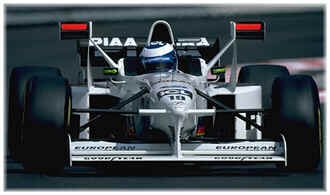
One team fell by the
wayside this year almost before it started and one
team announced it’s arrival for the ‘99
season. What the failed Lola team didn’t
have, the big and burgeoning Reynard Racing
team has. Huge cigarette sponsorship to enable them
to engulf a small team - in this case Tyrrell - and the ability to induce
faith into their backers. To enter F1 you have to be
standing on a pile of notes that looks exactly like
£50 million. This should guarantee you a year’s
stress free racing, but Lola's pile
just wasn't high enough and sparked off new FIA rules
forcing new teams to deposit vast amounts of cash up
front to show intent. This would be returned in a
trickle by the FIA over the course of their first two
participatory years. Who gets the interest remains to
be seen. It also makes the FOCA look like a solvent
bunch of professionals and the impending
‘floatation’ of Ecclestone’s private
property that is F1, on the stock market, could
re-burnish the sport’s tarnished edges. Having
suffered it’s ‘annus miserabilis’ Formula
1 has now to look forward to a new honesty and a
simplicity that keeps itself on track. The public
will only stand so much and the fat cats and
governing bodies could find themselves with the most
expensive toy in the world with no one to watch them
play.
It will be a different
brand of Champagne being poured with such vulgar
gusto at the end of each race next season as Moet
have now withdrawn their sponsorship on the grounds
that it ‘cheapens’ the value of their
product. Formula 1 will no doubt hold it’s
collective breath and close it’s eyes tight as
the race motor homes are erected in Melbourne on
March 8th. How Schumacher enters the fray, will be
scrutinised by the world, his mood will be noted and
his driving will be criticised no matter how he
performs.
Formula 1 has taken a
severe knocking this year and the ‘good
times’ have to return to the paddock. For the
world to keep watching to entice sponsors to stay in
the sport, their has to be a strong governing body to
back up the rules that it makes. This is the backbone
of motor sport. The fracas of 1997 must never happen
again. The circus has been given a clean bill of
health with the exorcisation of the ghost of Senna
and it should concentrate now on making the events on
the track as healthy as their sponsor’s budgets.
Chris Richardson F1
editor zoom@cix.co.uk
(A complete index
of all preview, qualifying and full race reports can
be found on the Speed Motorsport News
Championship pages)
Pictures courtesy
of the following: Chris Richardson, Goodyear Formula
1, David Coveney. For copyright information please
contact Speed Publications Limited.

